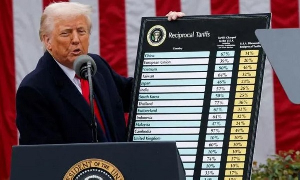Feature by Wilhelm Gaitu)
Ho, March 30, GNA - The most aggressive always gets to take the juiciest and biggest part when it comes to communal eating. Such has been the scenario in the scramble among public sector labour unions when it comes to negotiations with government for better salaries.
Medical doctors under the Ghana Medical Association, (GMA), Teachers under the Ghana National Association of Teachers (GNAT) and the National Association of Graduate Teachers (NAGRAT), Nurses under the Ghana Registered Nurses Association (GRNA) Civil Servants and Local Government Workers under the Civil Servants and Local Government Service Workers Association of Ghana (CLOSSAG), University Lecturers under the University Teachers Association of Ghana (UTAG) and the Polytechnic Teachers Association of Ghana (POTAG) have by their organizational unity and tactics secured much better salary packages for their members to reflect their professional values.
They are set to do same under the Single Spine Salary Structure (SSS= ) Already GNAT and NAGRAT have been able to secure a 15 percent retention allowance for teachers under the SSS in addition to a better placement on the SSS scale after a mass nationwide protest against their initial package under the SSS.
But conspicuously missing from this register of professionally organized labour groups is the Ghana Journalists Association (GJA) whose members, like lost sheep, are scattered among some workplace unions which are hardly able to reflect the value of Journalists working in those organizations, a situation fuelled by pathological jealousy of journalists.
The fate of Journalists in these splinter unions is worsened by their own lack of interest in the leadership positions and affairs of these unions, preferring to look on from the sidelines rather than exert strong influences to secure their professional interests in negotiations.
This fatalistic posture by journalists in the public sector media towards union affairs will undoubtedly cost them in this era of Single Spine Salaries.
In fact it has already claimed its first casualty in the case of the Ghana News Agency. Ironically, it is these journalists who tend to amplify the concerns and protestations of other professional bodies anytime they are up in arms against government in matters of salaries and improved conditions of service.
Gladly the leadership of the GJA has taken a cue from other professional bodies and has almost completed the processes of transforming the Association into a labour union. Journalists, especially those in the public sector, should congratulate this bold initiative and see the new phase of GJA as their source of collective strength for prosecuting their interests as other professionals are doing in the labour market. The current crop of GJA leaders deserve congratulation for actualizing what had been on the drawing board for years. There is however much work to do to position the Association on solid ground to cover grounds that have been lost.
Techniques and skills of labour organization and negotiations must be mastered through local and international collaboration. It is now time for journalists to mind their own business and secure their collective interest because wisdom teaches that you first have to secure yourself to be able to help others to secure themselves.
Journalists could only be the real crusaders, Fourth Estate of the Realm, if like soldiers, they have strong stomachs to march on, otherwise they would become pawns in others chess games. 30 March 11
Opinions of Thursday, 31 March 2011
Columnist: GNA
Journalists Spineless under Single Spine Salary
Entertainment



![Kwesi Pratt Jr [Left] and Ahmed Ibrahim [Right] Kwesi Pratt Jr [Left] and Ahmed Ibrahim [Right]](https://cdn.ghanaweb.com/imagelib/pics/884/88455494.295.jpg)









